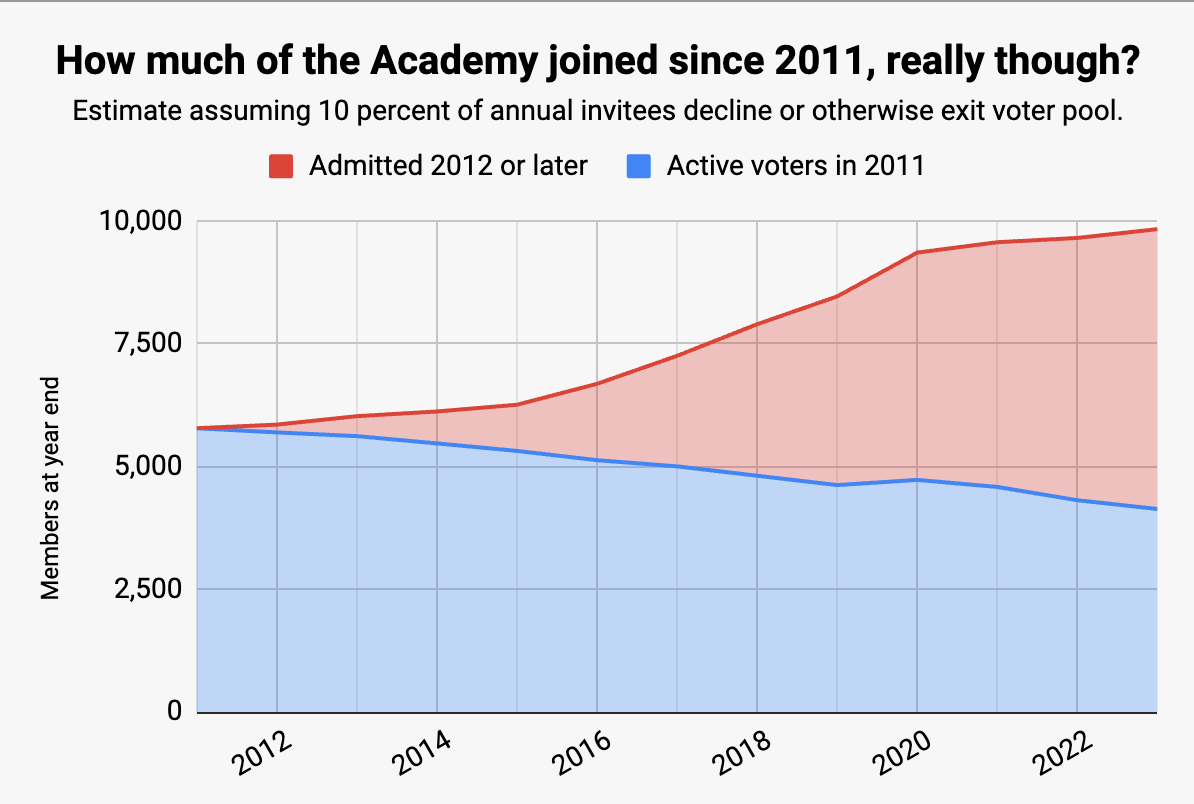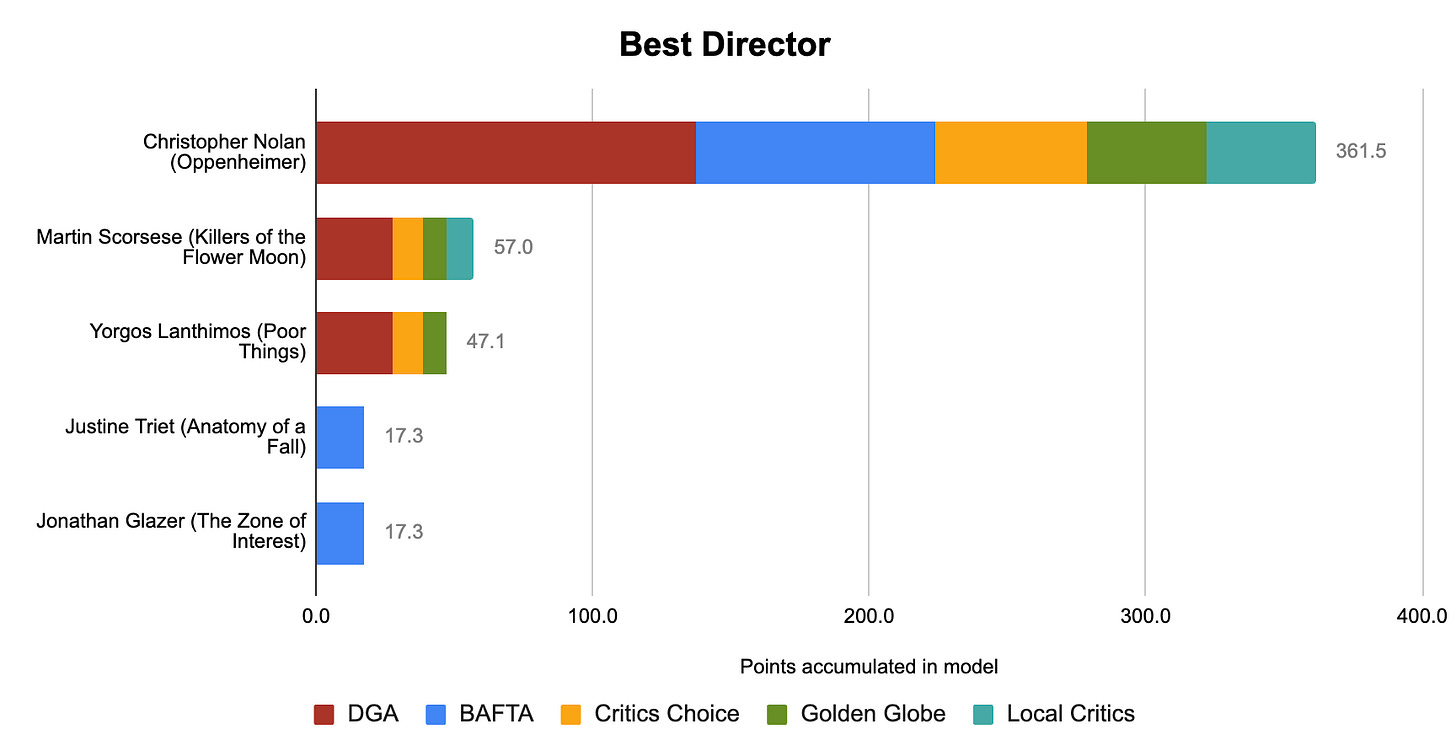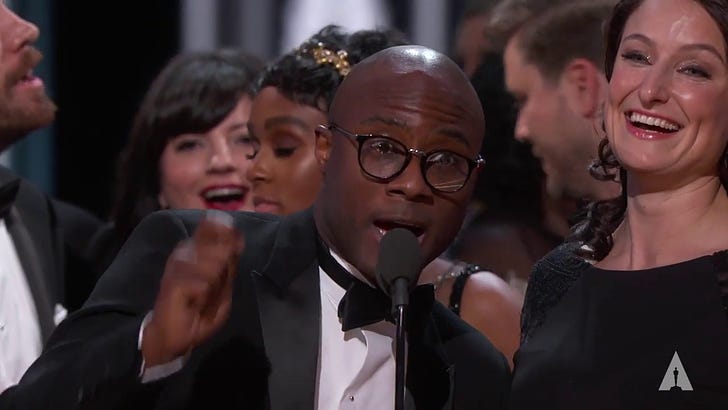Numlock Awards: The Final 2024 Oscars Forecast
Numlock Awards is your one-stop awards season newsletter. Every week, join Walt Hickey and Michael Domanico as they break down the math behind the Oscars and the best narratives going into film’s biggest night. Today’s edition comes from Walter.
We’ll do another mailbag after the awards this year! Send in thoughts, comments or questions to awards@numlock.news.
It’s here! We’ve arrived at the Oscars, and we’ve got our final forecast in and ready to go for an exciting season. Right now, we’ve got a really straightforward favorite in most of the categories we follow, but one of our favorites is seriously neck-and-neck and guaranteeing we’ll still be spending a few minutes on the edge of our seats this Oscar night.
More importantly, though, I think this year will end up being clarifying on a few nagging questions we’ve been trying to address over the past several years, questions that are at the very heart of why we care about the Oscars, what this organization has become, and what we’re all here for anyway.
But more importantly, this night has some real stakes. Is there a best picture favorite? Sure. Does that make things less interesting? Much to the contrary.
So, before we get to the final projections, let’s dive into where these forecasts come from, what goes into developing them, and why we bother.
How this works
Oscar forecasting has basically three main challenges:
We don’t have a full list of who actually votes for this thing.
We don’t have any way to directly poll them, which forces us to gauge their preferences indirectly.
The Academy has rapidly increased in size over the past decade, diminishing our ability to use historical data to project winners.
Those are serious challenges. It’s what makes this whole enterprise so fun, though. Here’s how we do it:
We don’t know exactly who they are, yet we know generally who they are, and we can identify other organizations — plugged-in critics groups who are targeted by the same campaigns and see the same films, or Guilds and professional organizations that have overlapping membership with the Academy.
We can’t poll them, but we can infer their preferences based on those critics and guilds, by going back in time and seeing how consistently those critics and guilds awarded the same winners as the Oscars. Some critics groups proudly flaut the consensus, and we can ignore ‘em, while others downright delight in calling Oscar winners early. We can assign them a score based on their reliability over the last couple years, and track that score across the season to figure out what contenders are actually ahead.
Lastly, the Academy has changed rapidly, but that just requires us to not be complacent when updating our scores. We’ll avoid using a score where, say, every one of the past twenty years are valued equally, and instead adapt to a what-have-you-done-for-me-lately model, where recent years are weighted higher than more distant ones.
We publish all our inputs, and all of our scores and algorithms are public here. There’s no black box and no secret sauce, and if you disagree with any of our assumptions you’re welcome to adapt the data to suit your needs.
All told, it is just exciting to try to suss out preferences of an enigmatic group of people and, incidentally, get this right a pretty high percentage of the time.
Best Supporting Actress
This race feels pretty much over. Lately, there’s been a category where one contender just sweeps everything, even the critic prizes. We saw it with director Chloé Zhao for Nomadland, a bit with Ke Huy Quan for Everything, Everywhere All At Once, just utter domination of all the local critic awards followed by a sweep of award season.
I hadn’t realized it until I finished compiling all the local critics prizes this year, but damn, Da’Vine Joy Randolph (The Holdovers) has been a force of nature this season.
We follow 25 regional critic prizes in this category; Randolph won Best Supporting Actress in 22 of them, losing only among the Columbus, Florida, and San Diego critic organizations, none of which is particularly predictive in this category. That kind of sweep is incredibly hard to pull off, and at least among actors — Chloé Zhao’s 27-for-30 performance probably can’t be beat — certainly seems to be the single most decisive run I’ve seen in the past decade, per my records.
Best Supporting Actor
Another situation where one contender — Robert Downey Jr. (Oppenheimer) — has utterly swept all the awards of consequence.
This one feels somewhat less preordained than the Randolph run, if only because the critics groups tended to be a little choppier in this category, with a handful of organizations recognizing some of the other nominees, and the other big name among the earliest awards, Charles Melton (May, December) getting snubbed. Nevertheless, Downey’s been completely decisive in the four awards we really care about, and enters the evening a prohibitive favorite.
Best Actor
This one is tighter — Paul Giamatti (The Holdovers) probably should not be counted out at the end of the day — but really, all the evidence is pointing towards Cillian Murphy (Oppenheimer, Oppenheimer) taking the win here.
Now, the Giamatti fans need not give up completely. The Golden Globes, which have long beguiled me when it comes to the source of their actual influence, saw both Giamatti and Murphy win, though dramatic comedy The Holdovers elected to compete in the comedy category so we didn’t actually see the men go head to head.
The Critics Choice broke for Giamatti, imperiling the Murphy bid, but then Cillian became the first Irishman to win best actor at BAFTA and then took home the SAG award, two incredibly consequential contests that reliably tip off our frontrunner in this category.
There’s certainly a shot, but Murphy seems set to win it.
Best Actress
This category rules, heck yeah:
A fun tension about this newsletter is that two things tend to be true about me personally:
I enjoy being right, and if I ever pretend I don’t enjoy being right, I’ve been kidnapped and I am attempting to discreetly signal that to you.
I genuinely like the Oscars and think that tight races make the whole thing way more interesting and thus it’s probably better for the whole operation if it remains hard to predict favorites at this award show.
I square these (at times) competing facts by pointing out that it’s pretty boring to pretend that you can just use math to predict the Oscars, and that the reality is that we’re doing the best we can to build a set of techniques to evaluate the shifting perspectives of a growing Academy.
That the challenge of doing that — hitting a bullet with another bullet when you don’t actually know where it was even shot from — is rewarding in its own right.
But damn, this is a good category! Made all the more interesting because the BAFTAs have made a choice that annoys me, selecting three nominees by vote and three nominees by blue ribbon committee. I’m a simple guy, I think democracy is pretty good, I think votes are the ideal way to decide stuff. Call me old-fashioned. I don’t love blue ribbon committees, especially in situations like this, where if I had to guess Lily Gladstone (Killers of the Flower Moon) just missed the nomination by vote and was passed over by the committee for whatever reason.
That means that the BAFTA voters had only one of the two real contenders in this category, and as a result yeah we’re probably going to doubt our instruments a little bit more than we normally would. I say that because Gladstone is clearly a competitor, and won at SAG and a host of local critics. So we’re dealing with imperfect information here, one that presents us with Stone with an edge, but I’m not sure if I trust that.
Are blue ribbon committees dumb? Yes. Should most things be decided by democracy? Also yes. Is it mildly infuriating but all-too-typical that the English insist on giving a permanent power to an unelected aristocracy to meddle in otherwise solid system? It’s classic them. But do I hate that they’re deliberately muddying the waters and making things interesting?
Not at all.
Best Director
Not even close:
Like, there isn’t even a runner up here. I don’t even know how you’d split that hair. Christopher Nolan’s gonna get it. Most interesting thing about this category I wrote weeks ago, it’s over:
Best Picture
As it stands, not too much mystery going into the finale:
One film has swept this race, winning the Producer’s Guild, the Screen Actors Guild, the Director’s Guild, the British Academy, the Critics’ Choice, the drama awards at the Golden Globes and American Cinema Editors, and it’s Oppenheimer.
It’s not often we get a complete sweep, but that’s where we’re at this year. Frankly, this kind of year makes me more nervous than a tight race — would be real rough to take an L like this, not gonna lie — but I’ll argue that the manner in which the Academy votes, by ranked choice, makes this pretty much a done deal.
Yes, underdogs can win in ranked choice, and often do!
But those underdogs that succeed in pulling off an upset all typically win something heading into the big night, some indication that the underlying support: an indication that the picture may not have a plurality in a field of ten, but possesses a majority when one really gets down to business of weeding out the non-contenders.
Parasite and Spotlight winning at SAG, Green Book winning the PGA, Moonlight’s the biggest upset in recent memory and even it won the Golden Globe for Drama. There’s some indication. And this year, for everyone else, there just isn’t.
If Oppenheimer loses it’s the biggest upset in decades. And that’s one reason why this night’s gonna be fun: yeah, it does have stakes.
We’re in the ninth inning of a no-hitter. Are they gonna make it happen?
It’s not boring. It’s explosive.
Check out our good friend James England for a different approach to a similar conclusion:











